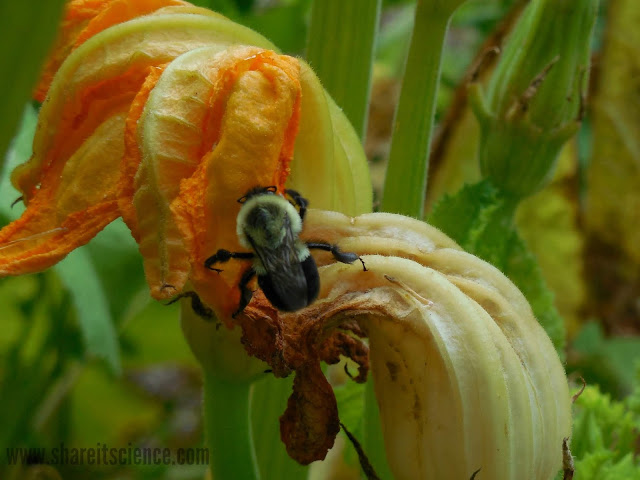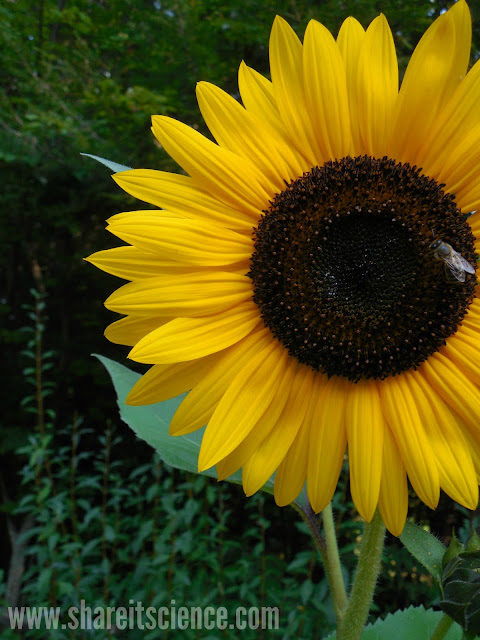This post is part of the 2019 Storybook Science series on the Inspiration Laboratories blog. For more activities linked to great children's books as well as other citizen science projects to try, check out the list of posts in the series here.
This post contains affiliate links, meaning I receive a small commission from purchases made from these links at no additional cost to you. Please see disclosures for more information.
Picture Books for Inspiring a Love of Bees
Bee & Me is a delightful wordless picture book by Alison Jay. It is the fictional story of a girl who meets a bee and cares for it in her city apartment. It eventually grows bigger than the girl and longs for flowers. They travel to the country to collect flower seeds and spread them around the city. The following spring the city is in bloom from sidewalk to roof tops.
Although the story is fantasy, it is a nice entry point to learning about the needs of bees and their part in the life cycle of plants. The end pages have suggestions for attracting and learning more about bees. Another bonus about this cute story is that it has no words, so you could share it with a wide variety of ages from readers to non-readers alike. This is just one example of some of the great new picture books that can inspire STEM activities with kids.
Another bee book I am highly anticipating is the unreleased, "Next Time You See a Bee" by Emily Morgan. The books in the "Next Time You See..." series are well written, engaging non-fiction stories that make great read-alouds for home or the classroom.
Kids Help Professional Scientists: Bee Citizen Science
Citizen Science is a method of crowdsourcing scientific research. Through the participation of volunteers, more data can be collected than might be otherwise. There are many kid-friendly citizen science projects.
There are so many ways people of all ages can contribute to science, whether it is local or online. Here are several ways to monitor and identify the bees in your area with kids. Contribute your observations to a science project and be part of an important scientific process.
Through Bumble Bee Watch go on a scavenger hunt for bumble bees. Snap a photo and submit it for identification. Grab a bumble bee field guide and have kids try their hand at identifying the bees.
With the Great Sunflower Project you can learn how to attract and count pollinators in your yard, and even get discounts on pollinator friendly seeds. Make observations to count how many pollinators visit your yard or observation area, then submit your count!
In the fall, take The Goldenrod Challenge. Team up with others to see how many different bees you can spot on goldenrod flowers and report your findings.
If you live in the states of Illinois, Indiana, Missouri or Ohio you can observe and count bees for the BeeSpotter project.
Visit PollinatorLive for all sorts of different pollinator citizen science projects as well as resources for teachers.
More Bee and Pollinator Activities
If you are looking for more activities to keep the bee and pollinator learning going, try out the following:
Communicate like a bee and code directions into a bee dance!
Learn how to plan and grow a garden that is attractive to pollinators.
Find more insect citizen science projects for kids here.
Learn how to build a colorful insect hotel with this project from the STEAM Kids book. (Especially great if you've got plastic straws you are trying to use up before transitioning to paper straws!!)
Story Book Science
Be sure to stop by Inspiration Laboratories for the full list of Story Book Science activities! You'll find more citizen science, STEM challenges, environmental science and space science themed books and projects this year.






Such important lessons for our kids!
ReplyDeleteYes! It's great to help them understand the interconnections between the natural world and the human-constructed one!
DeleteThis comment has been removed by a blog administrator.
ReplyDelete